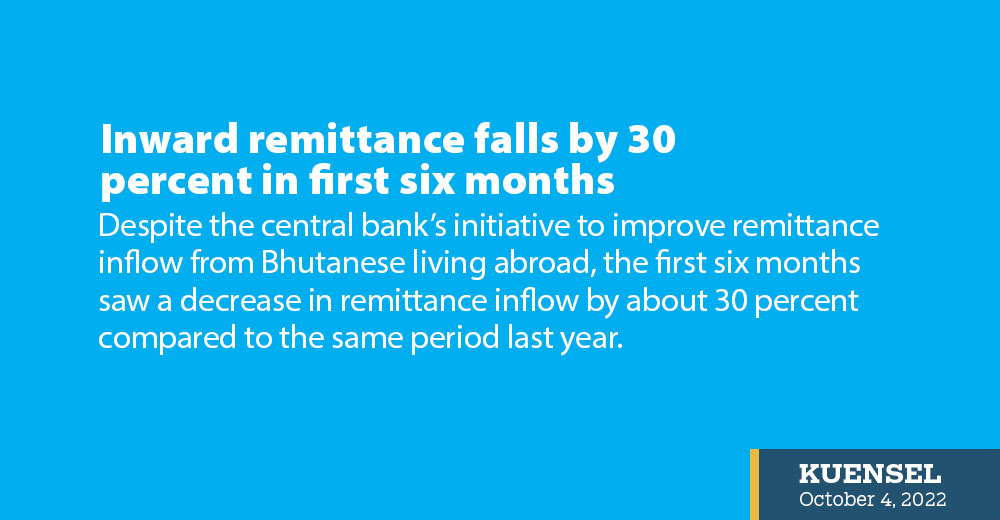Thukten Zangpo
Despite the central bank’s initiative to improve remittance inflow from Bhutanese living abroad, the first six months saw a decrease in remittance inflow by about 30 percent compared to the same period last year.
Bhutan received remittance of Nu 2.83 billion (B), equivalent to USD 38.12 million (M), in the first half of this year, a decrease of Nu 1.22B.
During the same period last year, the remittance received was Nu 4.03B, equivalent to USD 54.72M.
To encourage the remittance inflow, the central bank increased cash incentives from 1 to 2 percent for inward remittance from June last year until December this year.
Under the scheme, the beneficiaries will receive cash incentives of 2 percent upon converting the remitted amount in ngultrum using the prevailing exchange rates through banking channels and international money transfer operators.
Bhutanese living abroad can also maintain the foreign currency account and earn interest on foreign currency deposits offered by the commercial banks.
More than half the remittance received in the first six months of this year was Australian dollar remittance.
The AUD remittance received decreased by 35 percent to Nu 1.53B, equivalent to AUD 29.07M from Nu 2.36B, equivalent to AUD 41.38M in the same period last year.
One third of remittances received was denominated in USD, amounting to USD 13.39M, equivalent to Nu 1.02B. It saw a decrease of Nu 584M or USD 6.54M in the same period.
An economist said that if more Bhutanese go outside and pull their families and relatives abroad, this could lead to decline in inward remittance.
Remittances denominated in EUR also declined from Nu 60.89M to Nu 51.2M in the same period.
The remittance from Japan also saw a decrease to Nu 19.42M from Nu 59.33M, a decrease of Nu 39.91M.
The remittance that saw a growth was from the UK at Nu 29.96M from Nu 16.91M during the same period.
Similarly, the Canadian dollar and Singaporean dollar saw an increase at Nu 60.36M from Nu 27.95M and Nu 51.56M from Nu 32.21M respectively.
Remittance helps to improve the foreign exchange reserves and reduces the deficit in the country’s current account by improving the country’s balance of payments.
Remittance has been seeing a declining trend amid the country’s widening trade deficit and dwindling foreign currency reserves.
Bhutan’s trade deficit increased to Nu 27.3B as of June this year from Nu 13.12B as of March.
Similarly, foreign currency reserve was recorded at USD 839.6M as of June this year, which will be able to meet only 8 months of essential imports, as per the central bank’s provisional figure.
The reserve is 4 months less than the Constitutional requirement of reserve, enough for one year’s imports.
Foreign currency reserve is important for the trade to happen since the country trades over 70 percent with India and remaining with other countries.


